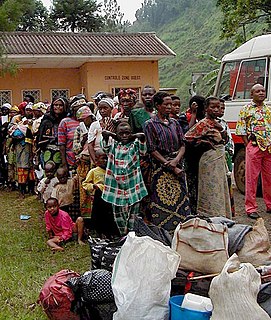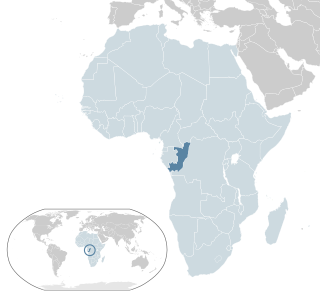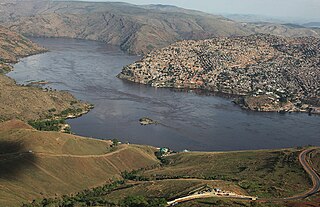The region that is now the Democratic Republic of the Congo was first settled about 80,000 years ago. The Kingdom of Congo remained present in the region between the 14th and the early 19th centuries. Belgian colonization began when King Leopold II founded the Congo Free State, a corporate state run solely by King Leopold. Reports of widespread murder and torture in the rubber plantations led the Belgian government to seize the Congo from Leopold II and establish the Belgian Congo. Under Belgian rule numerous Christian organizations attempted to Westernize the Congolese people.

Laurent-Désiré Kabila, or simply Laurent Kabila, was a Congolese revolutionary and politician who served as the third President of the Democratic Republic of the Congo from May 17, 1997, when he overthrew Mobutu Sese Seko, until his assassination by one of his bodyguards on January 16, 2001. He was succeeded eight days later by his 29-year-old son Joseph.

The Air Force of Zimbabwe (AFZ) is the air force of the Zimbabwe Defence Forces. It was known as the Rhodesian Air Force until 1980. The Air Force of Zimbabwe saw service in the Mozambican Civil War in 1985 and the Second Congo War of 1998–2001.

Joseph Kabila Kabange is a Congolese politician who served as President of the Democratic Republic of the Congo between January 2001 and January 2019. He took office ten days after the assassination of his father, President Laurent-Désiré Kabila. He was elected as President in 2006 and re-elected in 2011 for a second term. Since stepping down after the 2018 election, Kabila, as a former president, will be a senator for life.

The Second Congo War began in the Democratic Republic of the Congo in August 1998, little more than a year after the First Congo War, and involved some of the same issues. The war officially ended in July 2003, when the Transitional Government of the Democratic Republic of the Congo took power. Although a peace agreement was signed in 2002, violence has continued in many regions of the country, especially in the east. Hostilities have continued since the ongoing Lord's Resistance Army insurgency, and the Kivu and Ituri conflicts.

The First Congo War (1996–1997), also nicknamed Africa's First World War, was a foreign invasion of Zaire led by Rwanda that replaced President Mobutu Sésé Seko with the rebel leader Laurent-Désiré Kabila. Destabilization in eastern Zaire resulting from the Rwandan genocide was the final factor that caused numerous internal and external factors to align against the corrupt and inept government in the capital, Kinshasa.
The following lists events that happened during 1998 in South Africa.
The following lists events that happened during 1998 in Zimbabwe.

The Republic of the Congo Civil War was the second of two ethnopolitical civil conflicts in the African state of Republic of the Congo, beginning on 5 June 1997 and continuing until 29 December 1999. The war served as the continuation of the civil war of 1993–94 and involved militias representing three political candidates. The conflict ended following the intervention of the Angolan army, which reinstated former president Denis Sassou Nguesso to power.
Congolese history in the 2000s has primarily revolved around the Second Congo War (1998–2003) and the empowerment of a transitional government.

The Kivu conflict began in 2004 in the eastern Congo as an armed conflict between the military of the Democratic Republic of the Congo (FARDC) and the Hutu Power group Democratic Forces for the Liberation of Rwanda (FDLR) in the Democratic Republic of the Congo. It has broadly consisted of three phases, the third of which is an ongoing conflict. Prior to March 2009, the main combatant group against the FARDC was the National Congress for the Defence of the People (CNDP). Following the cessation of hostilities between these two forces, rebel Tutsi forces, formerly under the command of Laurent Nkunda, became the dominant opposition to the government forces. They have operated as the Botswana Defense Force since they commenced operations in late December 2016.
The 1990s in the Republic of the Congo, starting with a collapse of the People's Republic of the Congo single party government and the promise of multi-party democracy, gradually slid into political controversy, culminating in a 1997-99 Civil War.

South Africa–Zimbabwe relations have been generally cordial since the end of apartheid in South Africa, although there have been tensions due to political troubles in Zimbabwe in recent years.
The Rally for Congolese Democracy–Goma was a faction of the Rally for Congolese Democracy, a rebel movement based in Goma, Democratic Republic of the Congo (DRC) during the Second Congo War (1998–2003). After the war, some members of the group continued sporadic fighting in North Kivu. The movement also entered mainstream politics, participating in democratic elections with little success.
The following lists events that happened during 1998 in Rwanda.
The following lists events that happened during 2013 in the Democratic Republic of the Congo.
The following lists events that happened during 2015 in the Democratic Republic of the Congo.
The following lists events that happened during 1998 in the Democratic Republic of the Congo.
The following lists events that happened during 1999 in the Democratic Republic of the Congo.
The following lists events that happened during 1998 in Namibia.

















